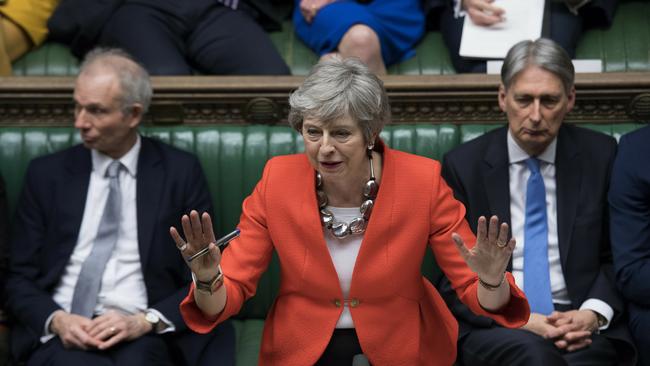May takes third Brexit vote down to the wire
Theresa May will recalculate the numbers right up until tomorrow morning’s third vote on the Brexit withdrawal bill.

British Prime Minister Theresa May will recalculate the numbers right up until tomorrow morning’s momentous third vote on the Brexit withdrawal bill.
Will the House of Commons finally back Mrs May’s Brexit — with all its flaws, loss of integrity and huge concessions to the EU — or will the exit from the EU be delayed for two years with the very real chance of remaining? Will Mrs May, politically indestructible up to now amid record-breaking mayhem, survive?
This will be the final chance for parliament to support Mrs May’s Brexit — if it gets tabled for the third time at all. It is finally time for the bad deal to be either booted, or incredibly, squeak across the line, after the negotiating tactic to walk away was removed as a political option by parliament.
Despite the high risk of Brexit failing altogether if the bill is not passed and after a weekend of frantic behind-the-scenes talks with MPs, Mrs May still may not have the numbers. Tory insiders say there is a significant chance Mrs May will pull the vote if she believes it will not succeed with about 17 Tories still believing it ties Britain to the EU and hands at least £39 billion ($73bn) to Brussels in return for no trade guarantees.
If the 10 Democratic Unionist Party MPs are finally satisfied they can vote for the deal, perhaps dovetailing with fresh generous allocations from the Treasury, another handful of Tories will also fall behind it.
Two ministers — Trade Secretary Liam Fox and Chancellor Philip Hammond — warned yesterday Mrs May would call the vote only if she was confident of the numbers. “It would be difficult to justify having a vote if you knew you were going to lose it,” Dr Fox told Sky News.
“We will only bring the deal back if we are confident that enough of our colleagues and the DUP are prepared to support it so that we can get it through parliament,” Mr Hammond told the BBC. “I mean we are not just going to keep presenting it if we haven’t moved the dial.”
If it looks Mrs May is a few votes short she will try to delay the vote for a week until after the European Council meeting in Brussels on Thursday. The EU member countries have to unanimously agree to any extension, whether it be short and technical as Mrs May wants, or a much longer one, which the Commons appears to want. Such EU support comes at an extortionate financial cost to Britain.
Former Tory foreign minister Boris Johnson wrote in his weekly Telegraph column yesterday that his constituents told him at a rate of six to one not to fold in any third vote. “They can see that if parliament agrees this deal, we do not, in fact, properly leave the EU on March 29. We simply become non-voting members. We will then spend the next few years — up to the end of 2021 if necessary — trying to settle all the questions that we have shirked,’’ he said.
Mr Johnson said the Irish border conundrum would be used as blackmail. “If we agree to this deal — and unless we have a radical change in our approach to the negotiations — we face an even greater humiliation in the second phase,’’ he said.
Wavering Brexiteers have been seeking guarantees Mrs May will stand down so a new leader can take control of trade talks with the EU.
Another complication is that Commons Speaker John Bercow may not allow the third vote because of a convention not to repeatedly table the same motion.
Labour leader Jeremy Corbyn has threatened a vote of no-confidence in the government saying it would be appropriate if the third vote is tabled and then defeated. The parliamentary instability could see such a vote passing, meaning the government would then have two weeks to demonstrate its ability to govern — probably with a new leader.
“She cannot keep bringing back an unchanged deal. It is ridiculous. She has got to recognise that we’ve got to do something different,’’ Mr Corbyn said.
He wants to create a cross- party consensus to discuss the proposal tagged Common Market 2.0 or Norway Plus. This idea is for Britain to be able to trade with the EU but it would have to pay for the privilege — suggested to be about half of the rates it currently pays to the EU, and still allow unrestricted migration.



